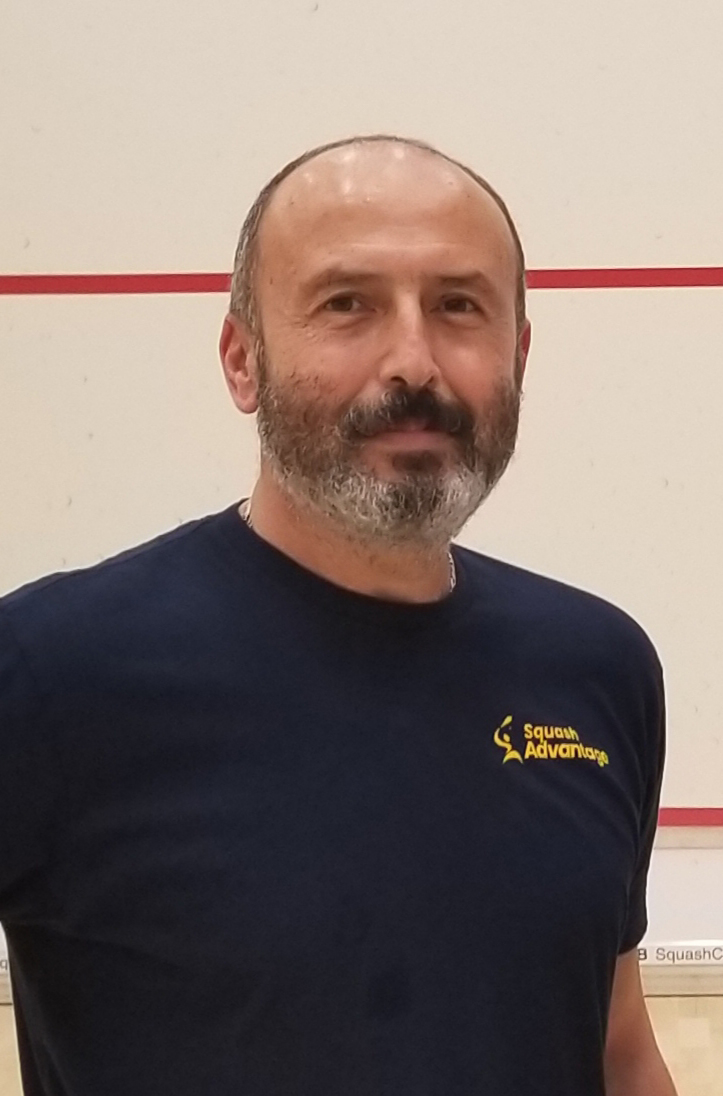|
Guide to the Greats

 Mike
Dale meets legendary coach Hesham El Attar, whose tutelage helped mould
many of Egypt’s modern-day stars Mike
Dale meets legendary coach Hesham El Attar, whose tutelage helped mould
many of Egypt’s modern-day stars
What do Ramy Ashour, Tarek Momen, Nouran Gohar, Karim Abdel Gawad, Karim
Darwish and Omneya Abdel Kawy have in common? The answer is coach Hesham
El Attar. His influence on these Egyptian titans’ careers has been truly
profound.
The mercurial Ashour calls him “one of the best coaches, if not the
best, I have ever dealt with.” Ex-world No.1 Gawad says: “He totally
changed my game... By far he is my favourite coach.” And for world
champion Momen: “Coach Hesham provides guidance to his players that far
exceeds the boundaries of a squash court.”
So what’s his secret? It lies partly in El Attar’s detailed vision - “a
complete picture” - of what makes a good squash player. “I'm a huge
believer in the mental, physical and technical parts all being linked.
You can't have any loopholes,” he explains.
“If a player’s approach and exit from a shot isn’t efficient, you can’t
build a good strategy around that. When one shot isn’t technically
perfect, I can tell what will happen to that player in a rally, the
problems they will encounter, when they will physically suffer and how
long they can maintain their intensity.
“It's the same with the psychological part. Players had their own sports
psychologists and mental trainers and I was able to convert that general
work into specific examples within rallies, situations with opponents or
referees they weren’t coping with, or their response to defeats.”
El Attar’s fascination with squash began aged six in India when he
peeked over the balcony to watch his father play. The family flitted
between Egypt, India and England and when abroad El Attar would fly back
to Egypt for tournaments.
He studied economics and psychology at the University of Cairo and took
a gap year in London to try out as a professional. Unsponsored and
unsupported, he slogged around the BSPA circuit and played the likes of
Phil Kenyon, Gawain Briars and Ross Norman in the American Express
League.
After graduating in 1986, he was taken under the wing of the great Abdel
Wahed, then Egyptian national coach, as his assistant, working with a
young Ahmed Barada (who won the World Junior Open and four British
Junior Open titles) and Omar El Borolossy (later part of Egypt’s first
ever World Team Championship winning side in 1999).
El Attar took Abdel Wahed’s place and later combined national coach
duties with a club job in Turin, where he married and started a family.
He missed Egypt while in Italy and his passion remained with nurturing
the young players of his homeland.
“I really love helping young people,” he says. “Young, prominent
squash players are upbeat, energetic, ambitious, a different breed. We’d
be around the club a lot and talk about their concerns and attitudes
outside of squash. We formed great friendships.
“It’s part of my job to help them deal with personal things that could
upset them and have a negative effect on their training or perforzmance.
It’s important for them to feel in control, happy and confident.”
Much work went into re-moulding Momen and Gawad’s natural, flamboyant
attacking instincts. “They were such good movers and that gave them the
confidence to back up their risky shots which so often opened up the
court,” El Attar explains. “They just thought that was normal! Being
solid and having a structure, then surprising your opponent with
something creative, that was what I tried to teach them.”
El Attar talks at a length worthy of a whole separate article about
working with the young Ramy. “It all came so naturally to him that he
didn’t rationalise it,” he reveals. “We worked on making better choices
at, like, 9-9 in a game; we studied his opponents’ movement to look at
which shot combinations they would find most disturbing and we improved
his consistency in training.
“Being such an artist, so creative and energetic, we needed to maintain
his interest and focus long-term by going beyond certain thresholds in
training. I knew that better preparation would send him into tournaments
with higher confidence.
“If you just rely on pure talent, it doesn’t work every day. He would
talk aggressively and negatively to himself on the bad days. Making him
analyse and rationalise was crucial for those days when it didn't quite
come so naturally.”
El Attar left the Egyptian job in 2013 and moved to the US. Now 56, he
has built a four-court academy named Squash Advantage in New Jersey
which opened in February 2019.
Having built up his personal client base in the US from three siblings
on a private court to nearly 70 youngsters at his own facility,
coronavirus has cut income, staff and player numbers by more than half.
“We’re surviving though,” he says with a smile. A man with his calibre
and zeal cannot be kept down for long.
|